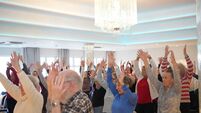Dr Michelle O'Driscoll: How to manage social anxiety

WHILE some people have a phobia of spiders, heights, or the dark, others can think of nothing worse than being in a room full of people (or even a few people!) and having to interact with them.
A definition of social anxiety refers to “fear of acting in a way or showing anxiety symptoms that offend others or lead to rejection, in addition to fear of humiliation or embarrassment”.
We try so hard to avoid these things in our daily interactions that we can end up making the anxiety, and how we behave as a result, worse – a spiral that can be very challenging to break out of.
Social anxiety is something people experience to varying degrees, sometimes to the point of debilitation in social situations, with about 5% of people experiencing it. At its worst, it affects self-confidence, relationships, and performance in work or school.
The physical symptoms of anxiety pop up when those with a fear of social situations find themselves in them. A racing heart, feeling flushed, shaking and sweating and negative thoughts are all commonly reported effects of social anxiety. It’s these symptoms that trigger further anxiety of what people will think of you for feeling this way! Worries of what to say next, or how must I look to this person, knaw away our self-belief and ability to function.
Author of several books and recent podcast guest on Owning It with host and author Caroline Foran, Dr Harry Barry shone a light on the practicalities of overcoming social anxiety. His most recent publication, The Power of Connection, delves into the art of communication, and how to master your conversation skills, body language and listening abilities.
Summarising his wisdom on the topic of social anxiety, there are two very helpful “golden rules” to remember.
1. Nobody can see you’re anxious – One of the huge fears of those of us that find social situations challenging is that we can often suffer from what is known as the “spotlight effect” when we experience anxiety. Because of the all-too-familiar hot, flushed, overwhelmed, physical feelings we experience, we assume that a figurative spotlight is shining on us, lighting us up for all to see. We think everybody can see our symptoms, and are thinking negatively about us as a result.
The reality is we cannot see these symptoms in others, even if we try.
So we can relax in the awareness that nobody else knows that this is how we feel, and we don’t look stupid - because it isn’t spottable!
2. Nobody cares anyway – even if our anxious symptoms were visible to other people, the fact remains that they wouldn’t notice or care, as they would be too self-concerned and distracted with their own stuff. A reassuring fact to remember at times when you feel the spotlight on you, or wonder why somebody isn’t getting back to you, is that they’re a lot less concerned with you than you are, and probably consumed by their own lives and associated challenges. This comes as quite the relief – it’s liberating to feel that spotlight focus shift.
Rule #2 is a really important consideration also for those who struggle in social situations to start or maintain a flowing conversation.
We can corner ourselves into silence when we overthink what interesting thing to say, or contribute to a discussion about ourselves, fuelling our anxiety further. What if we take the spotlight of the conversation and shine it where people tend to like focusing on most – themselves! Asking genuine and sincere questions about the other person is a great way to build rapport and get a conversation flowing.
The key to the success of this is in listening intently and authentically, and to follow on with subsequent questions.
Applying these rules, Dr Barry gives invaluable insights into how best to listen, the questions to ask, and how to say more by saying less. He makes radical claims of quickly banishing social anxiety for good with this approach, “once you do the work” he reminds listeners, “It takes practice. You have to do a bit of work.”
Where social anxiety is taking over and stopping you from living life fully, the best person to link in with is your GP. In the first instance, they can assess for other mental health difficulties, and signpost to the appropriate services and supports. Cognitive Behavioural Therapy, psychotherapy and sometimes medication are all options for consideration.







 App?
App?


